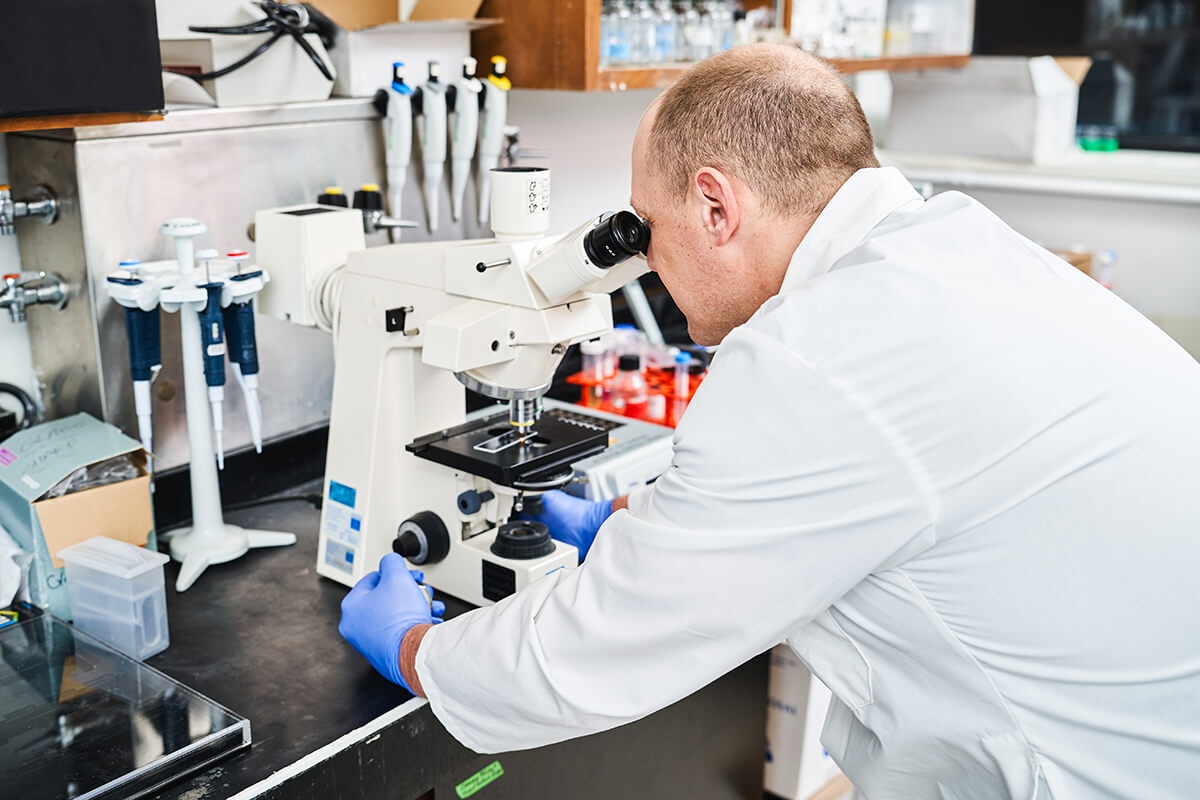
UM receives $57 million for vaccine and biomedical research and infrastructure
Largest federal research investment in UM’s history
The University of Manitoba (UM) in partnership with the Universities of Alberta, Saskatchewan and Calgary, has received $57 million in critical funding to conduct world-leading vaccine and biomanufacturing research and build two new innovative facilities, an investment that positions the institution to play a significant role in addressing future pandemic threats in Canada and around the world.
The funding was announced on May 6th by the Government of Canada and included a series of investments from the Canada Foundation for Innovation’s (CFI) Canadian Biomedical Research Fund (CBRF) and the Biosciences Research Infrastructure Fund (BRIF). The funds are designed to prepare for future health threats by increasing domestic capacity to produce life-saving vaccines.

Peter Pelka
The COVID-19 pandemic exposed gaps in domestic vaccine capacity and pandemic preparedness. To address this vulnerability, the Government of Canada has announced a series of strategic investments to enhance domestic vaccine development and biomanufacturing capacity, including $19 million for research capacity and $29 million to build two innovative research facilities on UM campuses. Remaining funds will be administered to other partner institutions.
Co-directed by Dr. Peter Pelka, professor in the Department of Microbiology in the Faculty of Science at UM, and Dr. Maya Shmulevitz, professor in the Department of Microbiology and Immunology at the University of Alberta, the multidisciplinary prairie-wide team comprised of UM, Alberta, Calgary and VIDO experts will establish a viral vaccine research and development cluster.

Maya Shmulevitz
Additional UM contributors include Elham Salimi, assistant professor, in Electrical and Computer Engineering in the Price Faculty of Engineering, Jason Kindrachuk, associate professor and Canada Research Chair in Molecular Pathogenesis of Emerging Diseases in the Max Rady College of Medicine, Brian Mark, Dean of the Faculty of Science, Jorg Stetefeld, professor and Canada Research Chair in Structural Biology and Biophysics, Keith Fowke, professor in Medical Microbiology and Infectious Diseases in the Max Rady College of Medicine, Xiaojian Yao, professor in Medical Microbiology and Infectious Diseases in the Max Rady College of Medicine, and Barbara Porto, assistant professor in Medical Microbiology and Infectious Diseases in the Max Rady College of Medicine.
The project is part of the PRAIRIE Hub on Pandemic Preparedness, a Western alliance bringing together expertise from the University of Alberta, Calgary, Saskatchewan, and Manitoba to accelerate research and discovery of vaccines and diagnosis. The Hub is focused on vaccine research, biomanufacturing practices, and workforce development in a coordinated system to improve outcomes and efficiency.
Creating next-generation vaccines for diverse populations
The researchers aim to accelerate the development of vaccines for commercial application towards emerging pathogens of concern. Researchers from across disciplines including computer science, engineering, microbiology, immunology, and economics will collaborate to create a new virus-vector platform for studying the delivery and efficacy of various vaccine archetypes, ease of manufacturing and public perception, amongst other factors.
Peter Pelka reacts to news of federal funding in the video above.
“We think of the platform like a mode of transportation for delivering a vaccine. The general public may be familiar with mRNA and non-mRNA vaccines, but there are actually many other ways to transport a vaccine. Our research will focus on exploring innovative technology applications with the goal of producing safe and effective vaccines for diverse populations,” said Pelka.
Researchers will also develop a vaccine pipeline that can be readily applied to emerging virus threats in the future. The strengths of artificial intelligence and machine learning will be leveraged to create predictive models for rapid drug development and large-scale biomanufacturing for commercial uses.
“We have all seen and felt the impact of pandemics and are determined to be prepared for a better future,” said Shmulevitz. “Our team spans decades of expertise across many critical disciplines, and will innovate a world class vaccine development program here in Canada. It’s wonderful to see Canada leveraging the best and brightest talent of the public and private sectors to take leadership in pandemic preparedness.”
Two world-class research facilities to be built on UM campuses
Funding will enable the construction of cutting-edge research infrastructure to develop, test and manufacture vaccines at scale. UM will build two new facilities that can prepare, test and biomanufacture vaccines for pre-clinical trials and delivery around the world.
A federal investment of $19 million will support the PRAIRIE Biologics Accelerator, a state-of-the-art 2-story, 21,000 sq fit biosecure facility. Located on the Fort Garry Campus, this new dedicated laboratory space will bring together scientists and engineers to support the development of new vaccines and approaches to improve the reliability and speed of biomanufacturing at scale.
A second lab, the PRAIRIE One Health Emerging Respiratory Disease Centre, is to be built on the Bannatyne Campus. Once complete, the facility will provide much-needed laboratory capacity to enable pre-clinical vaccine testing against high-risk pathogens of concern in a safe and secure way. Federal funding of $10 million will support the construction of this facility. It will provide Containment Level 3 Ag (CL3Ag) laboratory space, a highly secure and specialized level of testing not currently available in Manitoba, and will enable bioprocess development, diagnostics research, and training opportunities.
“As a member of the Faculty of Science, this is very exciting as it will be the first new research facility for us in over fifty years,” said Pelka. “These cutting-edge labs will significantly improve our vaccine and biomanufacturing research capacity while making us more competitive in attracting and recruiting top research talent from around the world to work and study in Manitoba.”
Investments from other stakeholders – including the provincial government and philanthropists – are needed to ensure the successful completion of these critical labs. By bringing together academic, industry and government partners, the facilities will provide space to research teams from UM’s two campuses and other universities including Alberta, Saskatchewan, and Calgary.
Dr. Mario Pinto highlighted the significance of this investment in elevating UM’s position as a strategic research leader in life sciences and biomanufacturing.
“By bringing together some of the brightest minds across Western Canada, UM continues to excel in infectious disease and biotechnology research. With this strategic investment from the Government of Canada, our researchers will be able to lead in the development of vaccines for a wide range of diseases.” said Mario Pinto, Vice-President (Research and International).
UM is a globally recognized research leader in pandemic responses to pathogens, vaccine development and structural biology. In 2005, two UM researchers made international headlines for developing the treatment for Ebola at the Public Health Agency of Canada’s National Microbiology Lab in Winnipeg. For more information on this announcement, please visit: Government of Canada funds new projects to further grow the domestic biomanufacturing and life sciences sector – Canada.ca.
Research at the University of Manitoba is partially supported by funding from the Government of Canada Research Support Fund.






